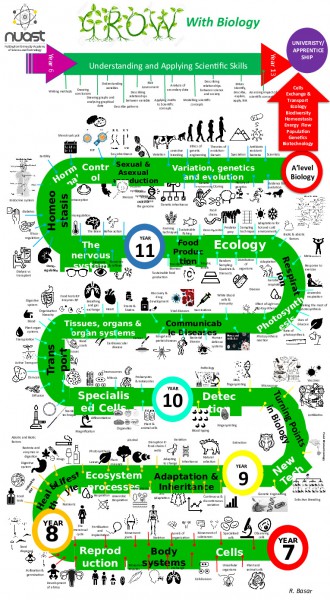Biology

Biology is the science of living things. Biologists study the structure, function, growth, origin, evolution and distribution of all living organisms.
Throughout the GCSE course, students will learn about how living things really work and where each living organism fits into the bigger picture. During the AS course, students will then get the chance to delve deeper into why things are the way they are. It can be incredibly satisfying to begin to form an understanding of the more difficult concepts and form links between them.
Here at NUAST, we study biology through a combination of practical and theoretical work; we cover a range of topics, including cellular and molecular biology, microbiology, biodiversity and conservation.
GCSE Biology
A-Level Biology
Overview
A-level Biology is a challenging and rewarding course that helps students develop the skills and knowledge necessary for a successful career. We follow the AQA course for GCE A level in Biology. During the course, students will gain an understanding of the link between the central concepts of Biology and the way in which scientists undertake investigations. Students will also see how far the contributions of science apply to modern society and the developments taking place every day.
Topics / Modules to be covered
Year 12
- Unit 1 Biological molecules
- Unit 2 Cells
- Unit 3 Organisms exchange substances with their environment
- Unit 4 Genetic information, variation and relationships between organisms
Year 13
- Unit 5 Energy transfers in and between organisms (A-level only)
- Unit 6 Organisms respond to changes in their internal and external environments (A-level only)
- Unit 7 Genetics, populations, evolution and ecosystems (A-level only)
- Unit 8 The control of gene expression (A-level only)
Assessment
Internal/continuous:
The students will be internally assessed through a variety of tasks which include, but are not restricted to, end of topic tests, assessed tasks, homework, mid-year and end of year internal exams. Feedback is shared in a timely way, so that students have the opportunity to improve.
External Exams are at the end of the course in Year 13, consisting of 3 papers:
Paper one: What's assessed?
Any content from topics 1-4, including relevant practical skills: 2 hour written exam (91 marks) consisting of 76 marks (a mixture of short and long answer questions) and 15 marks of extended response questions.
Paper two: What's assessed?
Any content from topics 5–8, including relevant synoptic links to unit 1-4 and practical skills: 2 hour written exam (91 marks) consisting of a mixture of short and long answer questions (76 marks) and 15 marks of comprehension questions.
Paper three: What's assessed?
Any content from topics 1–8, including relevant practical skills. 2 hour written exam (78 marks) consisting of 38 marks of structured questions, including practical techniques. 15 marks: critical analysis of given experimental data. 25 marks: one essay from a choice of two titles
Homework
Students should be studying for at least 5 hours per subject. This will be a mix of formally set homework, independent study assignments and self-directed study.
Homework is set by the class teacher and will be based around the learning students have completed in the lesson. The tasks within the homework will endeavour to encourage students to apply their knowledge and also encourage their interest in the subject.
Homework will be marked in a number of ways which can involve teacher assessment which will be returned within two weeks. Students will then be provided with feedback that they can act on.
Students will also be allowed the chance for immediate feedback by checking over homework during the lesson either as a self-assessed or peer assessed task.
Science News
- Y10 Girls in Physics trip
Some lucky NUAST students attended a day hosted by The University of Nottingham. (13/07/2018) - Rocket trip at Kimberly school
The trip was organised by the University of Nottingham and the Ogdon trust. (21/06/2018) - Y12 Chemists educational visit to The University of Nottingham
Chemistry lectures and thunder and lightning demonstrations (24/01/2017) - NUAST students come second from 200 schools!
Chemistry Challenge (20/01/2016)
